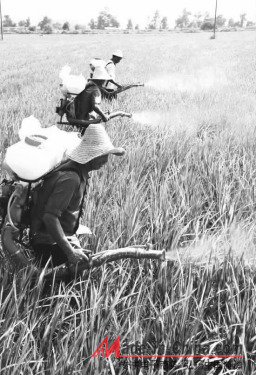Uv Lamps Curing Lamp,Quick-Drying Ink Lam,Low Power Consumption,365Nm 395Nm Uv Lamps Foshan Yichu electronic lighting Co., LTD , https://www.eonelights.com After three consecutive years of suffering from pesticides, many people in the industry believed that the market demand was good in 2011. However, in the twinkling of the eye, the pesticide market did not reverse as expected in the industry at the end of the year. Market sentiment is still gloomy.
After three consecutive years of suffering from pesticides, many people in the industry believed that the market demand was good in 2011. However, in the twinkling of the eye, the pesticide market did not reverse as expected in the industry at the end of the year. Market sentiment is still gloomy.
According to data from China Business Intelligence Network, at the end of September 2011, there were 772 pesticide manufacturing enterprises above designated size in China. From January to September 2011, China's pesticide industry realized its main business income of 140.138 billion yuan, up 28.51% year-on-year; total profit reached 8.05 billion yuan, up 23.47% year-on-year. However, the cumulative loss-making enterprises in the industry reached 83, with a loss of 10.7%. Loss-making enterprises suffered a loss of 370 million yuan, an increase of 105.9% year-on-year.
"I don't want to let the factory die in my own hands." Zhang Conde, the person in charge of the Jixi Yinong Agrochemical Plant in Anhui Province, was full of sadness and helplessness. Since the establishment of the plant in 1992, the Longxi Agrochemical Plant has passed 20 years. As a national designated pesticide production enterprise, it was extremely popular. In 2008, the output value of this plant glyphosate reached 120 million yuan.
However, the glory of the past has long been in sight. “We have made up our minds since April this year to publicly 'list transfer'. Employees have also started to disperse in April and have only retained financial and some sales staff. Now it is too difficult for small and medium-sized pesticide companies to survive.†Zhang Conde was a bit tired. Said.
With the market continuing to slump, more and more pesticide companies have been forced to the edge of a collapsed cliff. In the past two years, in many industry websites, forums, and magazines, from time to time, they can see the "transition declaration" issued by a pesticide company or similar announcement. According to the preliminary statistics of the Southern Rural Daily reporter, there were at least 20 pesticide companies that publicly “peddle†in 2011, many of which are state-designated pesticide companies like the West Yunnan Yinong Agrochemical Plant.
After going through these consecutive years, manufacturers, distributors, and retailers have accumulated large quantities of inventories and the market demand has decreased. However, the production volume of enterprises has not decreased. The relevant statistics show that in 2010, China's pesticide production was about 2.342 million tons, and the export volume was It was 1,126,300 tons, while domestic consumption was only 302,000 tons. China's pesticide production this year is about 2.55 million tons, but the total demand is only about 308,000 tons, and it is still less than 1/8 of the output. At the same time, the export volume of pesticides in the first three quarters was only 611,000 tons. This also means that domestic stocks will exceed at least 1 million tons. Due to excessive production, the domestic pesticide production enterprises' profit level is not high. At the same time, due to the large number of pesticide companies and the serious homogeneity of the products, the companies have lowered their prices, and the vicious competition in the market has intensified. The recovery of the pesticide industry is still tortuous.
From the 27th China Plant Protection Information Exchange Conference held in Xiamen, it was reported that in 2012, the total demand for pesticides in China increased slightly from this year, with a growth rate of 2.48%. From the perspective of this year's autumn crop, it is expected that the wheat seed treatment agent will have a larger market share in the next 3 to 5 years. According to relevant statistical data from 31 provinces (autonomous regions, municipalities directly under the Central Government) level of plant protection and phytosanitary stations nationwide, the total demand for pesticide products in China in 2012 is estimated at 984,000 tons (equivalent to 314,600 tons), which will increase by 2.48% from this year. Among them, the demand for pesticides in 2012 was 124,100 tons, an increase of 1.2% year-on-year; the demand for herbicides was 97,300 tons, which was the same as this year; the demand for plant growth regulators was 3,457.62 tons, an increase of 7.41% year-on-year.
This news is a big plus for domestic pesticide manufacturers. However, due to the overcapacity situation in the pesticide industry in China, and the limited growth in demand for pesticides in China, the overall performance of pesticide production enterprises in China has been declining this year. It is expected that the development prospects for the next year will not be very optimistic.
Faced with the aggressive competition situation and multiple predicaments in the pesticide market, domestic pesticide companies and management departments should remain calm. It is possible to temporarily slow down the investment rhythm, overcome the impetuous mentality, re-analyze development ideas, and fully understand the different needs of farmers, and carefully analyze the future. 5-10 years of pesticide market trends, through active R&D and development of specialty dosage forms, exploration of safe, environmental, and labor-saving technologies, effective management methods such as adjustment of market strategies, and improvement of management capabilities of the company itself, with a steady state of mind and long-term Vision, ready for a protracted war.